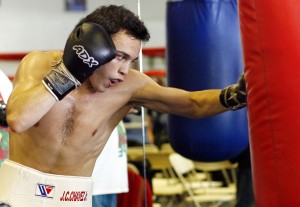Frustrated Chavez Jr. announces February title defense at Alamodome

SAN ANTONIO – Mexican middleweight titlist Julio Cesar Chavez Jr., known as much for his father’s exploits as his own, is fully aware of what made him famous. He knows he is known for his father’s achievements in boxing more than his own, and he knows he’s known it for a long time too.
Difference is, he no longer accepts, with a frown and a shrug, others’ pointing it out.
Tuesday at Alamodome, Chavez (44-0-1, 31 KOs), in town to announce his Feb. 4 title defense against fellow Mexican Marco Antonio Rubio (53-5-1, 46 KOs) – as part of an HBO “Boxing After Dark” card that will also feature “Filipino Flash” Nonito Donaire (27-1, 18 KOs) and Puerto Rico’s Wilfredo Vazquez Jr. (21-1-1, 18 KOs) in a super bantamweight title match – was at times nonchalant and at times animated, and a little frustrated throughout.
“First they told me that I have to fight Rubio because he is the (WBC) mandatory (challenger),” Chavez said in his native Spanish, in response to a question about his rumored reluctance to fight recognized middleweight world champion Sergio Martinez. “And Rubio says that I will never make that fight because I fear him. I agree to that fight, and now they say that I fear Martinez.
“I fear no one!”
The increased aggressiveness in Chavez’s tone Tuesday marked a frustration born of his last visit to this city in June 2010, a visit that saw him decision John Duddy at Alamodome in an excellent fight Chavez considered a gateway of sorts.
“The night against Duddy was the best of my career,” Chavez said. “I proved that I can be known for more than just the name of my father.”
A title-winning effort, and HBO debut, followed 12 months later, with a match against Sebastian Zbik. Five months after that, Chavez returned to Texas and stopped Peter Manfredo in Houston. Immediately following Chavez’s November win over Manfredo, though, Sergio Martinez stood silently at the postfight press conference, asking lots of questions by his presence alone.
“They want to make money with my name and my fame,” Chavez said of those fighters who have called for a match with him. “Of course I am frustrated.”
For his part, Marco Antonio Rubio was more anxious to right previous wrongs than take Chavez’s name or celebrity.
“We are going to try to correct many errors that we have made in this career,” Rubio said in Spanish, from the press-conference podium.
Rubio’s promoter, Mexican Osvaldo Kuchle, went a few steps further.
“I’ve heard fans say, ‘Maybe Rubio is just here for a payday. Maybe Rubio’s going to take a dive,’” Kuchle said from a press-conference stage overlooking the Alamodome football field that on Saturday will host the 2012 U.S. Army All-American Bowl. “No, this is a fight that is cultural.”
If super bantamweights Nonito Donaire and Wilfredo Vazquez Jr., who both preceded Chavez and Rubio to the podium, were not animated or frustrated as their co-headliners, they were decidedly more charismatic and respectful to one another.
“You become an elite by fighting elite fighters,” Vazquez said in Spanish, before turning to face his February opponent. “Men like Mr. Nonito Donaire.”
“He’s a good person, a great guy, but I know that he comes to fight,” Donaire said about Vazquez, when Donaire’s turn at the dais came. “This is what makes boxing great: Two guys that respect each other but go out there to tear each other’s heads off.”
Bart Barry can be reached at bart.barrys.email (at) gmail.com